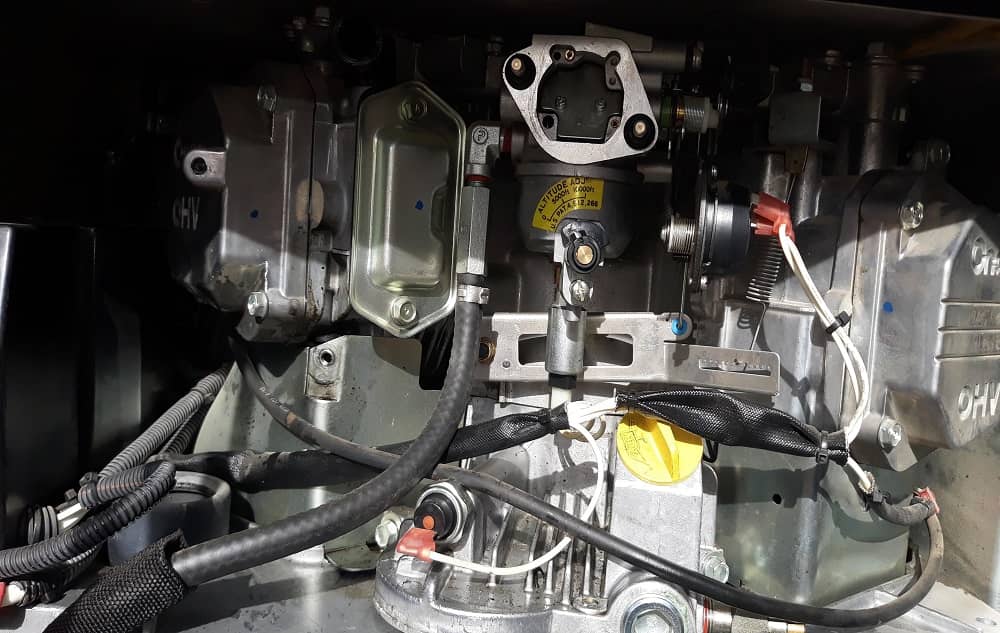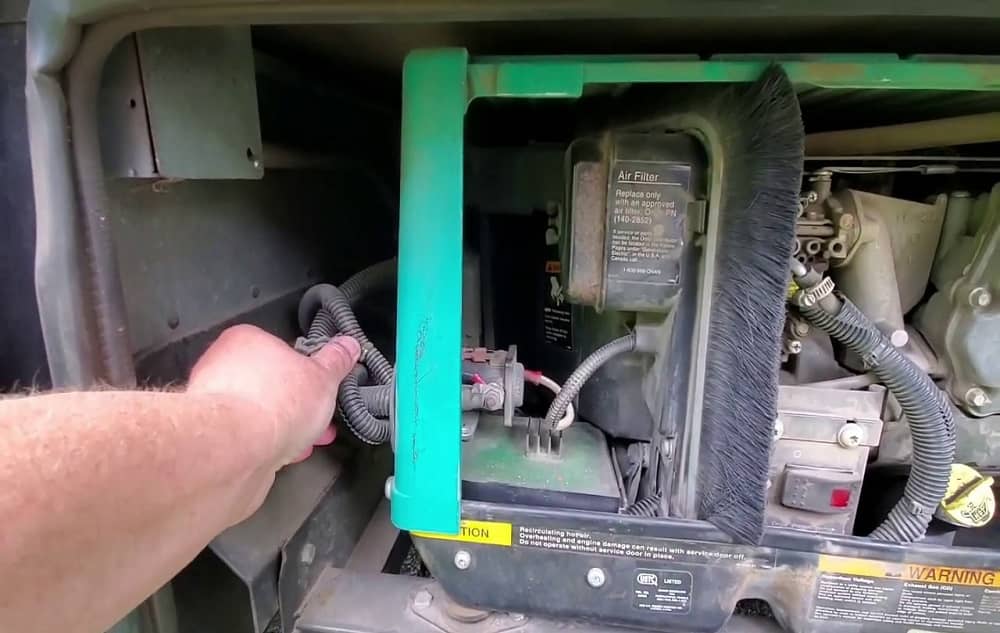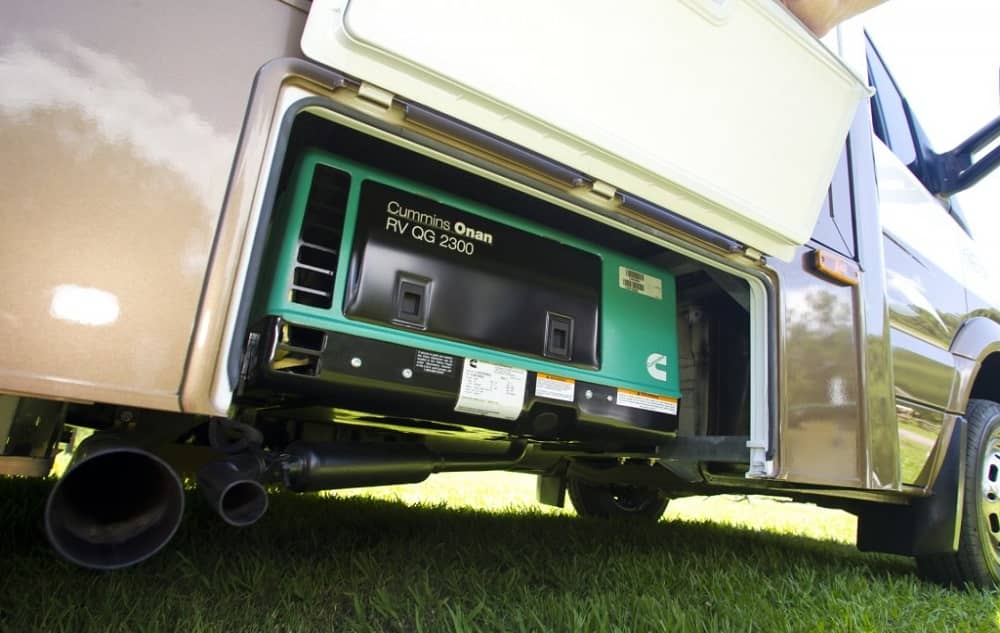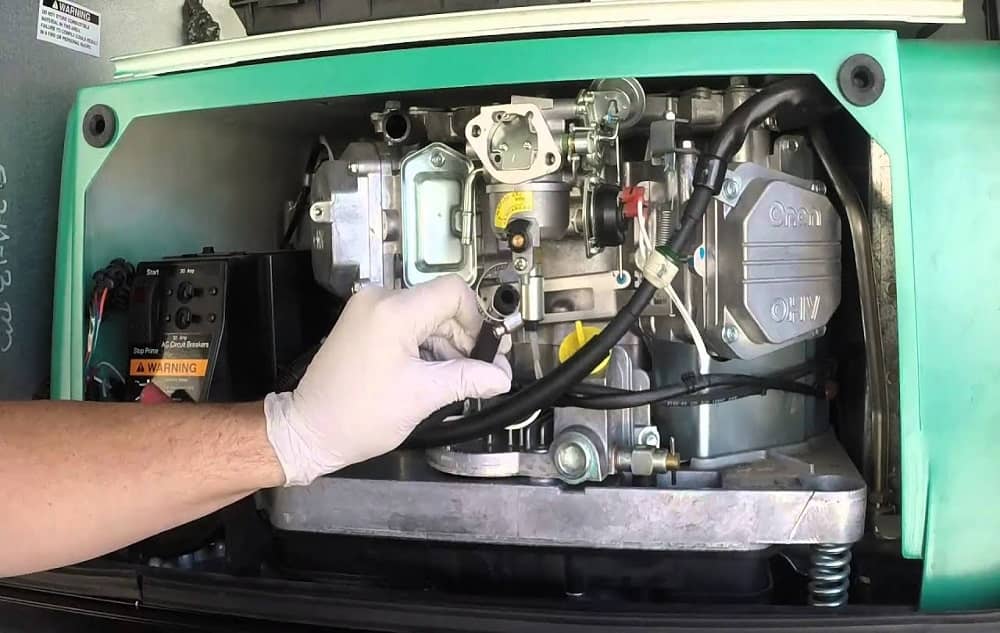When you buy through links on our site, we may earn an affiliate commission, Read More.
Imagine how you’d feel when you’ve settled in for a boondocking and find that your RV generator won’t start? No doubt, the situation will be frustrating.
Needless to say, an RV generator is the reason your rig’s electric appliances run, when you park it off the grid. However, at times it struggles to generate spark and inevitably fails to start.
Fortunately, the reasons are quite common in most cases, when the fixes are simple enough for an average handyman to perform.
RV Generators Won’t Start: Common Reasons & Troubleshooting

The thing is, RV generators often vary by model, have slightly different settings, and run on different fuels implies that you should always check the manufacturer’s manual first. You will find specific troubleshooting instructions recommended for your particular setup there.
Don’t worry if you lost it. You will always find an online copy by searching for your device model. You can also reach the manufacturer via phone or email and consider using their support.
This is to make you realize that handling a mechanical device requires expertise to some extent. Apart from dangerous electric shocks, you may run the risk of invalidating your manufacturer’s warranty as well.
With this in mind, let me address some issues today that may fail your RV generator to start. This includes:
- Lack of fuel
- Stale Fuel
- Low oil level
- Issues with House Battery
- Expired Generator
- Worn Out Parts & Replacement
Let’s briefly discuss each of them below and the best solutions you can opt for.
Tools You Might Need
Running Out Of Fuel
Needless to say, your RV generator won’t start if it doesn’t have enough fuel in the first place. Alternatively, if you’re using propane, the propane generator won’t start either, without having the required gas in the tank.
So, when you’re troubleshooting RV generator problems make sure to check the fuel level first. Most of the time, if the fuel tank gets below the one-quarter mark, your RV generator won’t turn over.
Nowadays, modern RVs often feature a ‘low fuel’ sensor to keep the generator from depleting its main reservoir. The system shuts off the generator automatically once its fuel reaches a minimum level.
That being said, the generator may still crank in this situation. However, don’t force it to start without resolving the issue at hand. There is no point in simply letting the battery drain this way.
How to Fix?
The fix is really simple knowing that you can easily check the fuel gauge and refill. However, it is equally important that you’re adding the right type of fuel.
Also, note that most built-in RV generators share the RV’s main fuel tank and are directly connected to it through a tube. Thus, you need to look at whether it is firmly connected and isn’t elevated at any point.
For a propane generator, make sure that the primary valve and all the tubing on the tanks are open before paying your visit to the gas station.
Old Fuel In Standalone Generator
If you have a standalone unit and it is out of touch for quite a while, the fuel in the generator will stale. As a result, the quality will deteriorate.
N.B. Never resume your RV generator when it has fuel sitting there for two months in particular.
Otherwise, you can get into trouble either by damaging the engine or by calling off other RV generator problems.
How to Fix?
You have to get rid of all the bad fuel and replace the filter. Make sure to use a safety kit while cleaning up the fuel tank. However, in such a case, I won’t recommend you to try this by yourself unless you have the skill and experience on your back.
Seek help from expert mechanics and get in the habit of using fuel stabilizers to prevent this from happening in the future.
Low oil level
Like any automotive system, RV generators need oil to properly lubricate the engine’s integral parts and keep it running smoothly. But when it gets low, different aspects of the engine will stop functioning, and the generator might start acting strange.
Therefore, checking the oil level is a significant assignment in a motorhome generator troubleshooting. In most cases, this happens when you don’t change the oil every 50 hours of use.
How to Fix?
Use your generator dipstick and check the oil level by putting it inside the oil lid. If the oil is low, review the RV owner’s manual and top up the required amount.
However, if it seems too dirty, take help from an RV mechanic and replace it with fresh oil. While it is not mandatory you might also want to change the oil filter.
Problems With House Battery
Since built-in RV generators receive voltage from the house coach battery, the culprit might be found there. Thereby, when your RV generator won’t start, inspect the battery and make it a priority on your checklist.
How to Fix?
First, ensure that the battery is sufficiently charged. Then examine all the connecting ports and make sure they are clean and attached properly in place. If you’re running an old battery, it is also possible that corrosion and leakage are seen in some areas.
A good multimeter will be handy to test whether the battery is dead or worn out. However, if such a scenario arises, buying a new one becomes obvious.
Generator Is Outdated
Let’s be honest, at some point every mechanical device will finish its lifecycle and become obsolete. Your RV generator is no exception, even with proper upkeep it won’t last forever.
You may have a well-used generator running for many years. On the other hand, it could be a used device, in which case you can’t tell how well it was maintained.
How to Fix?
Before replacing your old generator try everything you can on your end. If you aren’t technically profound consult a certified professional and let him diagnose the issues. However, if it is confirmed that the device is outdated, go for the best aftermarket solution.
Parts Need Replacement
So far, we have talked about the most familiar wrongdoers that might prevent your RV generator from starting. However, bad fuel, a worn-out battery, and low oil aren’t the only things you will check.
Just in case you need to know, a generator comprises many mechanical components, electrodes, and terminals.
With uses, anything can be corroded and fail the system altogether. Some common parts like air filters, spark plugs, and fuel filters, can be miserably clogged, or worn out over time and may need periodic replacement.
How to Fix?
When you fail to start the generator, try to catch a glimpse of all the moving parts and critical joints. Confirm whether there is any sign of wear or if anything is broken, or loose. Don’t forget to equip yourself with a proper toolset and gloves while inspecting any leakage.
Having said that, you won’t always detect physical damage and may find it tough to understand what has gone wrong. If this is the case with you, call an expert who can isolate and diagnose the underlying issue.
Onan Generator Troubleshooting

Despite that Onan makes the best RV generators for campers, there is no exception to other appliances that experience problems over time. Luckily for you, most troubleshooting isn’t intimidating particularly if you have the right information available.
Here are the typical malfunctions and diagnostic tips to keep your Onan generator up and running again.
Air Filter Clogging
A clogged airflow system is one of the very first reasons why an Onan generator will not start. As you can guess, generators require a good amount of air in order for them to function correctly. However, with time and use, impurities will develop and might restrict the airflow.
You can pull it off the generator and check if this is the case. If you see the air filter is clogged, remove the debris either with a brush or by gently punching it on the ground. However, if corrosion appears on different partitions, it needs replacement.
Degraded Carburetor
Following the clogged air filter, contaminated gas will enter the carburetor. And this may trigger Onan generator starter problems. To avoid this, the simple trick is to clean the impurities periodically. You can do this without separating the part from the system. Just grab a carburetor cleaner and spray it into the orifice, this works fine.
Voltage Regulator Troubleshooting
When your Onan generator starts then shuts down, you should also look at the voltage regulator assembly. It receives voltage coming from the control board and stabilizes it to support your generator ignition.
You can find the regulator inside the control box. You’ll need a voltmeter for this test. At first, attach the voltmeter positive lead to pin 7 while the negative goes on the ground. Now check the meter reading. It should reflect 12 points for pin 7.
Do the same on the motor brush and verify whether it shows readings between 10 and 11 Volts. If the voltmeter provides no display the voltage regulator is malfunctioning.
Fuel Filter Issues
If everything looks okay till now and still your Onan generator fails to start, the problem might be tucked inside the fuel filter.
To address the issue, first, disconnect the fuel line from where it is linked to the carburetor. Now, wait and see the fuel travel through the oil filter. If that isn’t happening, the fuel filter is likely to have choke-ups and needs to be replaced.
Troubleshooting Codes
Many latest models feature specialized Onan generator troubleshooting codes that detect generator faults and a code appears on the display. You can see the meaning in your Onan generator troubleshooting manual and seek a repair person to troubleshoot accordingly.
General Maintenance Tips For RV Generator

Needless to say, a well-maintained generator is unlikely to face many issues. Yes, there are certain aspects of it you can’t control from happening, like when parts get too old and require a replacement. But if you stick to good upkeep your RV generator will continue to perform for years to come. Here is a handy checklist that you should be mindful of:
- Dirty containers are often responsible for fuel contamination. Therefore, make sure to use a clean reservoir for extended shelf life. Also, store it in a place where the temperature doesn’t fluctuate much. Finally, before adding it to the engine check for any rust.
- Standing fuel usually takes 3 to 6 months before they decline. And, I would suggest you discard any fuel that has been stored for 6 months in a container. Because old fuel, (gasoline/diesel) tends to absorb moisture, and when mixed with the good one may create engine problems.
- Don’t allow any fuel in the tank or the supply line for more than 2 months during storage. Drain them if you have any and then run the engine until it stops. However, according to automotive experts using fuel stabilizers may help when storing for 30 days or longer (doesn’t apply to propane generators).
- One of the easiest ways you can maximize your generator life is to run it for at least 30 minutes every month. For best outcome keep your 500 to 1500-watt appliances on (AC, Freeze, etc.,) during this period. The moderate load will help the generating components get warm and keep them healthy.
- Clogged filters consume the necessary air or fuel before reaching the cylinder and thus impair engine combustion. Thereby, you should keep the oil/air/fuel filter clean, and replace it periodically (as per the manufacturer’s recommendation).
- The exhaust spark arrestor helps the engine to release the burned gases. Therefore, keep it clean before it is miserably clogged and accelerate long-standing engine issues.
Other Points to Remember
- Keep your generator clean as much as possible.
- Keep an eye on the oil level and refill as needed.
- Use anti-freeze if needed and replenish according to the owner’s manual
- Check the spark plug periodically and release all the deposits.
- Inspect all the connecting wires and rubber hoses.
- Keep the generator in a dry place to prevent dampness.
- Maintain records of the things that have been checked.
Frequently Asked Questions
1. Is a generator a must-have for RVs?
While an RV generator is not necessary, having one is worthwhile for full-timers. It is very convenient especially in the event of a power outage or roadside breakdown. It also comes in handy when you go off to places and need to run the AC while driving.
On top of that, it gives more flexibility knowing that you can choose your RV rally space with limited facilities for electric hookups.
2. Can you run your generator while sleeping at night?
Generally, we don’t run the RV generator at night unless we’re boondocking and the power goes off due to storms. Moreover, some parking bases have restrictions and quiet times when you won’t be allowed to use the generator.
However, when the RV isn’t plugged in and you need the generator, make sure to have an exhaust deflector installed so that all exhaust is vented above the roof. Also, keep your AC running to draw fresh air and offset some CO (carbon monoxide). You might also install and check CO detectors for abnormal readings.
3. Why does the starter make a clicking sound but the engine does not crank?
This sound might come from the starter solenoid when it engages the flywheel. This also happens when the coach battery runs out of charge, or due to poor battery connections. Try again with the battery in full charge. If it doesn’t eliminate the issue, take it to a good RV repair shop.
4. Why does the 120V system go down when the AC, microwave, and TV are all on?
You should not overload the generator running many appliances at a time. Usually, the issue is resolved when you reset the circuit breaker. When resetting, make sure to turn it off and then on again.
Check whether they are in good shape and consider replacing them. You may also run a test for a tripped GFCI and reset it. If these fixes don’t work, consult an expert.
Final Verdict
It would be annoying if the RV generator wouldn’t start given that it could ruin your weekend plan to go off the grid. Thus, knowing how to fix an RV generator will help you to better handle the situation.
In addition to that, it’s important to spend time on maintenance so that you can stay ahead of the game. And, coming to the end, I hope the article has served its purpose in this regard and is of use to you.


